MUSIC
NICHOLAS MEDTNER, who is seventy this year, has had the unique experience of being suddenly, in mid-twentieth century, adopted by a Maecenas rich enough to order recordings and concerts of his music, of seeing on the threshold of old age the works hitherto only known to other musicians placed before the general public. Medtner has always been before all else a pianist. He was a favourite pupil of Safonov and one of the gifted trio—Skryabin and Rachmaninov were the other two—who seem to have brought to an end the great line of performer-composers, and were the most distinguished of the second generation of Moscow " Westernising " musicians. Less original than Ski yabin and less brilliant than Rachmaninov, Medtner has often combined in his music the quali- ties of late-nineteenth-century Gerdian romanticism and a German interest in form for its own sake with a Slavonic tenderness and a Slavonic sense of the apocalyptic. - None of these qualities has made him a popular composer. Living in Western Europe—first in France and now in England— he has only once returned to Russia since heJeft it five years after the outbreak of the revolution. His smaller piano pieces—Fairy Tales, Dithyrambs, Improvisations, Hymns—have been played by a few pianists, but their simple lyrical quality and their technical Unpretentiousness have militated against their success in the concert. hall. The sonatas and concertos have never achieved more than a succes d'estime, their scale and volubility 'of -manner appearing ill-suited to the material and to the composer's habit of thought, Of songs, Medtner has written something, like a hundred, nearly equally divided between settings of German and Russian poets. (There are some thirty settings of Goethe and twenty-five of Pushkin.) In many of these the piano part has an undue pre- ponderance, and the virtuoso has the better of the singer.
This was the case in some of the German songs admirably sung by Elizabeth Schwarzkopf at the Maharajah of Mysore's Medtner concert in the Kingsway Hall on November 6th. Sheer complica- tion of rhythm or figuration in the piano part can destroy a song even when the vocal line is beautiful and apt in itself, and none of these songs had, to me, the beauty of some of Medtner's Russian songs—the settings of Fet and Tyuchev of op. 24, for example. The violin sonata played by Manoug Pa'rikian and Colin Horsley, though full of charming and poetic ideas, seemed oddly prolix and undisciplined for a composer confessedly concerned with form ; and the piano quintet, on which the composer has apparently been working intermittently for over forty years, suffered from a charac- terlessness, a lack of definition, which may well be the result of excessive reconsideration and rewriting, a scrupulousness fatal to spontaneity of invention. A concert of Medtner's music without any piano works is, in fact, something of a monstrosity, and I listened in vain for anything which recalled the sweep and power of, for example, the E flat major Dithytamb fronf op. 10.
* * At Covent Garden, Joan Hammond and Walter Midgley make a fine, though ill-assorted, Butterfly and Pinkerton. Joan Hammond, who had not seemed able to identify herself with Aida or to rise to the necessary heights of lyrical tragedy in the part, made a touching and convincing figure of the novelette heroine upon whom Puccini expended his strangely mixed gifts of subtle musician and Latin vulgarian. Wilma Lipp is the best Queen of the Night we have yet had at Covent Garden, though badly hampered by haying to sing up aloft and with the depth of the stage between her and her audience. Marko- Rothmiiller is a supremely efficient but not a powerfully dramatic Amonasro. And Rhadames . . . a


















































 Previous page
Previous page